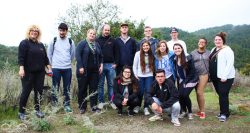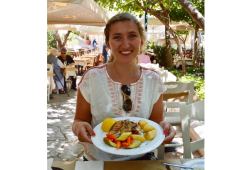 Paige McNeil is a Hospitality Management Major at the University of Denver, currently enrolled in Umbra’s Food and Sustainability Studies Program. This semester, Paige has become an active contributor to the Umbra Voice, Umbra’s journalism and communications club that hosts a student blog. The blog is meant to reflect the experiences of Umbra students, providing them with an outlet to share their experiences, while also providing a source of valuable travel information for current and future students.
Paige McNeil is a Hospitality Management Major at the University of Denver, currently enrolled in Umbra’s Food and Sustainability Studies Program. This semester, Paige has become an active contributor to the Umbra Voice, Umbra’s journalism and communications club that hosts a student blog. The blog is meant to reflect the experiences of Umbra students, providing them with an outlet to share their experiences, while also providing a source of valuable travel information for current and future students.
Paige is the author of the new Umbra Voice section, Monday Mangiamo, a section in which she highlights her favorite food of the week. Paige’s articles share a mix of recipes, her travel locations, and information about the local cuisine she sampled in each place. Paige presents the historical and cultural significance of Croquettes and patatas bravas tapas in Spain, and mouth-watering descriptions of “spaghetti with white wine butter sauce, steamed mussels and clams, and cherry tomatoes”.
“The tastes, textures, and flavor combinations amaze me every time I try something new,” shared Paige. “I love trying new foods and learning about the cultures that they come from.” Paige is passionate about food and hospitality. She decided to write for the Umbra Voice to gain new experience as a writer and has described her work as “a great opportunity to share my many food experiences while I am exploring Italy and Europe.”
Are you interested in contributing a piece to the Umbra Voice? Contact Ashley at [email protected].



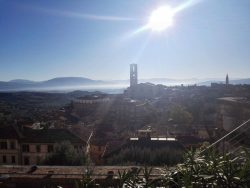 As many have expressed concern for the Umbra community, we would like to report that the city of Perugia and the Umbra Institute were unaffected by this morning’s earthquake in Italy.
As many have expressed concern for the Umbra community, we would like to report that the city of Perugia and the Umbra Institute were unaffected by this morning’s earthquake in Italy.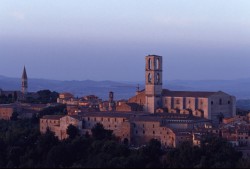 As many have expressed concern for the Umbra community, we would like to report that the city of Perugia and the Umbra Institute were unaffected by this evening’s earthquake in Italy.
As many have expressed concern for the Umbra community, we would like to report that the city of Perugia and the Umbra Institute were unaffected by this evening’s earthquake in Italy.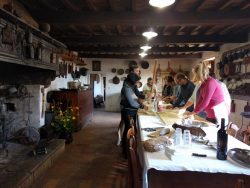 ANFS 370:Anthropology of Food students explored the notion of food as cultural heritage by visiting two sites in Città di Castello: the heritage orchard “Fondazione Archeologia Arborea”, and the Research Center and Museum of Folk Traditions or “tradizioni popolari”. Below is a reflection written by one anthropology student, Gerard Pozzi:
ANFS 370:Anthropology of Food students explored the notion of food as cultural heritage by visiting two sites in Città di Castello: the heritage orchard “Fondazione Archeologia Arborea”, and the Research Center and Museum of Folk Traditions or “tradizioni popolari”. Below is a reflection written by one anthropology student, Gerard Pozzi: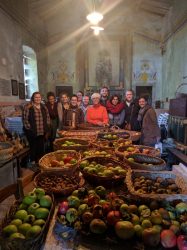 The heritage farmhouse was an enriching experience, engaging all of the senses to experience what life in this farmhouse once resembled. I was interested in the agricultural and household equipment, from old tractors to (what was then) innovative kitchen tools. My favorite room, I (unsurprisingly) have to say, is the kitchen. The immense hearth in the center resonated with me, as it put emphasis on the process of making the local version of torta al testo, ‘ciaccia.’
The heritage farmhouse was an enriching experience, engaging all of the senses to experience what life in this farmhouse once resembled. I was interested in the agricultural and household equipment, from old tractors to (what was then) innovative kitchen tools. My favorite room, I (unsurprisingly) have to say, is the kitchen. The immense hearth in the center resonated with me, as it put emphasis on the process of making the local version of torta al testo, ‘ciaccia.’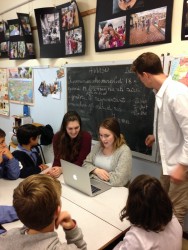 As in previous semesters, students will return to provide an interactive language and culture lesson
As in previous semesters, students will return to provide an interactive language and culture lesson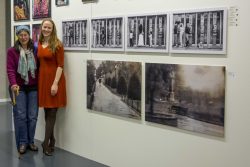

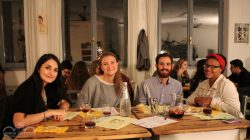 Students enjoy discussing lifestyle and cultural differences among friends
Students enjoy discussing lifestyle and cultural differences among friends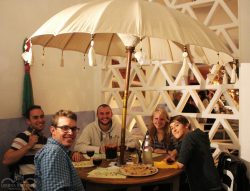
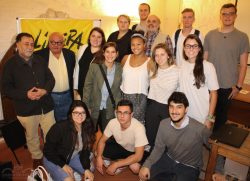 Students after a presentation about the Mafia in Umbra’s Aula Magna
Students after a presentation about the Mafia in Umbra’s Aula Magna